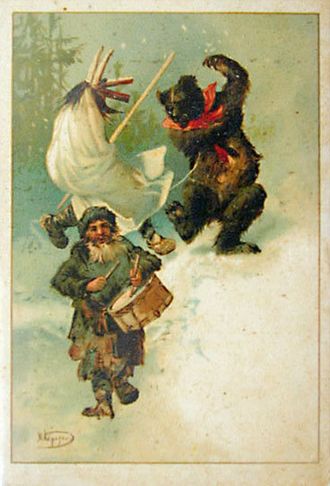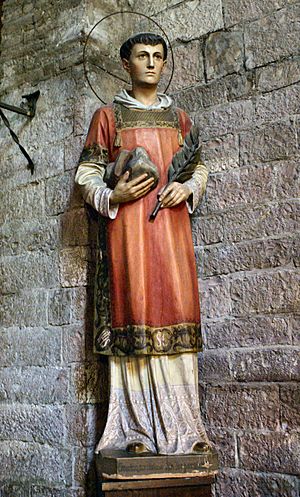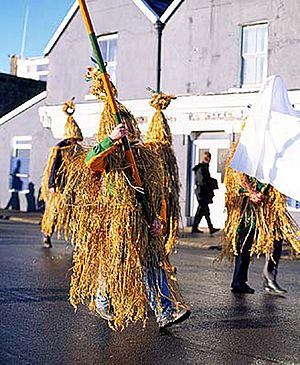Saint Stephen's Day facts for kids
Quick facts for kids Saint Stephen's Day |
|
|---|---|
 |
|
| Also called | Feast of Saint Stephen |
| Observed by | Christians |
| Type | Christian |
| Date |
|
| Frequency | Annual |
| Related to | Boxing Day (concurrent), Christmastide, Wren Day |
Saint Stephen's Day, also known as the Feast of Saint Stephen, is a special Christian holiday. It remembers Saint Stephen, who was the very first Christian martyr. A martyr is someone who dies for their beliefs.
This day is celebrated on December 26th in many Western Christian countries. In Eastern Christian countries, it is often celebrated on December 27th. Some Eastern churches use an older calendar called the Julian calendar. For them, December 27th on their calendar falls on January 9th of the Gregorian calendar, which is the calendar most of the world uses today. Saint Stephen's Day is the second day of the Christmastide season, which is the twelve days of Christmas.
Saint Stephen's Day is a public holiday in many places. This means schools and businesses might be closed. Some of these countries include Austria, Germany, Ireland, Italy, Poland, and Sweden. It is also a holiday in countries that celebrate Boxing Day on the same date, like Australia, Canada, and the United Kingdom.
Contents
Who Was Saint Stephen?

Saint Stephen's Day is part of the Twelve Days of Christmas. It honors Saint Stephen, who was one of the first Christian martyrs. He was killed for his faith around the year 36 AD.
How People Celebrate Saint Stephen's Day
People celebrate Saint Stephen's Day in many different ways around the world. These traditions often involve family, food, and old customs.
Ireland's Wren Day
In the Republic of Ireland, Saint Stephen's Day is a public holiday. People sometimes just call it "Stephen's Day."
In the Irish language, it is called Lá Fhéile Stiofáin. It is also known as Lá an Dreoilín, which means Wren Day. This name comes from old legends about the wren bird. On Wren Day, some people dress up in old clothes and straw hats. They go from door to door with fake wrens, singing and playing music. These groups are called "wrenboys" or "mummers." This tradition is not as common as it used to be.
There are also Mummer's Festivals held in places like New Inn, County Galway and Dingle in County Kerry. Many families visit relatives or go to the theater to see a pantomime. In Northern Ireland and parts of County Donegal, this day is usually called Boxing Day.
Welsh Traditions
In Wales, Saint Stephen's Day is called Gŵyl San Steffan. It is celebrated every year on December 26th. An old Welsh custom, which stopped in the 1800s, involved hitting people who woke up late with holly branches. This was thought to bring good luck.
Celebrations in Catalonia
Saint Stephen's Day (Sant Esteve) on December 26th is a holiday in Catalonia, Spain. Families traditionally have a big meal that includes canelons. These are pasta tubes filled with ground meat. The meat might even be leftovers from the Christmas Day meal, like turkey or capó.
In Catalan-speaking areas, this day is also known as the Second Christmas Day. In the Valencia area, families often eat with the father's side of the family on the 26th. On the 25th, they eat with the mother's side. This holiday might have started a long time ago. It gave people time to travel home after Christmas Day gatherings.
Customs in Central Europe
In Austria, Germany, the Czech Republic, Slovakia, and Poland, December 26th is also a public holiday. It is often called the Second Day of Christmas. In Austria, people might have ceremonial horseback rides and bless horses.
Finland's Sleigh Rides
In Finland, Saint Stephen's Day is called Finnish: tapaninpäivä. A well-known tradition is "the ride of Stephen's Day." This refers to fun sleigh rides with horses through village streets. These lively rides were a contrast to the quiet mood of Christmas.
Another old tradition involved parades with singers and people dressed in Christmas outfits. Stephen's Day used to be a popular day for weddings too. Today, many people go to dances held in restaurants and dance halls.
Bulgaria's Stefanov Den
In Bulgaria, the Orthodox Church celebrates Saint Stephen's Day, or Stefanov Den (Bulgarian: Стефанов ден), on December 27th. On this day, people who have a name related to Stephen often receive gifts.
See also
 In Spanish: Día de San Esteban para niños
In Spanish: Día de San Esteban para niños
- Boxing Day
- Good King Wenceslas
- Wren Day


